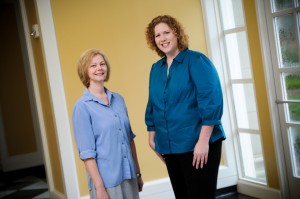
TUSCALOOSA, Ala. — The National Science Foundation selected two University of Alabama professors for CAREER Awards totaling more than $1.45 million for research into two proteins and their roles in disease.
These awards, presented to Drs. Laura Busenlehner, assistant professor of chemistry, and Kim Caldwell, assistant professor of biological sciences, are part of the federal stimulus package and are NSF’s most prestigious recognition of top-performing young scientists who are beginning their careers.
In addition to developing a better understanding of the two proteins, the awards’ impacts include economic ones. Three full-time graduate research assistant positions and one part-time undergraduate position will be funded, all for five years. They will also fund four full-time positions for undergraduates during five successive summers, as well as equipment purchases.
These are the third and fourth NSF CAREER awards won by UA faculty in recent months. Two other UA chemistry professors, Drs. Michael Jennings and Timothy Snowden, won during the spring. The latest winners bring UA’s NSF CAREER funding to some $2.55 million in recent months.
Busenlehner’s 5-year, approximate $697,500-award will further her research into a protein called frataxin. A frataxin deficiency results in a neurodegenerative disease called Friedreich’s ataxia. This disease, which frequently strikes patients during adolescence, causes progressive damage to the nervous system.
Striking about one in every 50,000 people, the disease’s initial symptoms include loss of coordination and slurred speech, and it often later leads to complete loss of muscle control and heart disease. There is no cure, and life expectancy rates are greatly shortened by the disease.
Friedreich’s ataxia is characterized by a toxic build-up of iron inside mitochondria – the “power plants” of cells. Busenlehner is focusing on how frataxin binds to iron and how iron is transferred from frataxin to other proteins that require iron for their function.
Caldwell’s 5-year, approximate $753,600-award will focus on a protein called torsinA. Through her research, Caldwell hopes to better understand how the protein functions and its impact on neurons in the brain.
TorsinA has shown an ability to protect against the loss of the brain’s dopamine-producing neurons. The demise of these neurons leads to Parkinson’s disease and its trademark symptoms – rigid and tremoring limbs, difficulty in movement and impaired reflexes. The disease is estimated to affect more than 1 million Americans. Specific defects in torsinA can lead to another movement disorder called early-onset dystonia.
Steps toward improving treatments or developing cures for disease typically first call for a thorough understanding of it.
Caldwell uses specific strains of tiny nematode worms, known as C. elegans, as animal models in her research to unlock basic mechanisms for how torsinA functions to manage stress inside cells.
Each award also contains an educational component. Through it, Caldwell will create a new course where undergraduates will answer the question, “What do biologists really do and think about?” Students in UA’s new Emerging Scholars Program, established in 2008 to increase retention for underrepresented groups by exposing them to research, will enroll in the new course.
Busenlehner’s educational plan will create a new course for undergraduate and graduate students, incorporating many of the protein chemistry techniques used in her research. She will also organize a mini-symposium to highlight research achievements of underrepresented groups in science, including women and minorities, from regional colleges and universities. Lodging and travel costs for guest speakers will be paid for through the award.
UA’s chemistry and biological science departments are both part of the College of Arts and Sciences, the University’s largest division and the largest liberal arts college in the state. Students from the College have won numerous national awards including Rhodes Scholarships, Goldwater Scholarships and memberships on the USA Today Academic All American Teams.
Contact
Chris Bryant, assistant director of media relations, 205/348-8323, cbryant@ur.ua.edu
Source
Dr. Laura Busenlehner, 205/348-0269, LSBusenlehner@bama.ua.edu; Dr. Kim Caldwell, 205/348-4021, kcaldwel@bama.ua.edu